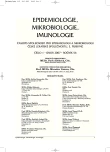-
Medical journals
- Career
Effects of Trace Elements on the Immune System
Authors: N. Lukáč; P. Massányi
Authors‘ workplace: Slovenská poľnohospodárska univerzita v Nitre ; Katedra fyziológie živočíchov, Fakulta biotechnológie a potravinárstva
Published in: Epidemiol. Mikrobiol. Imunol. 56, 2007, č. 1, s. 3-9
Overview
Trace elements as essential micronutrients play an important role in various physiological processes and are crucial for proper functioning of the immune system. Deficiency of trace elements and infectious diseases are often concomitantly observed and result in complex interactions. The major trace elements such as selenium, zinc, copper, manganese, etc. have immunomodulatory effects and thus influence susceptibility to and the course and outcome of a variety of viral infections. Some trace elements inhibit viral replication in the host cells and therefore have antiviral activity. Many trace elements act as antioxidants or are able not only to regulate the host immune response but also to alter the viral genome. This article gives a brief review of the major interactions between the trace elements and the immune system.
Key words:
trace elements – immune system – enzymes.
Labels
Hygiene and epidemiology Medical virology Clinical microbiology
Article was published inEpidemiology, Microbiology, Immunology

2007 Issue 1-
All articles in this issue
- Effects of Trace Elements on the Immune System
- Tetanus Immunity in the Elderly in the Czech Republic
- Microbial Biofilms in the Food Industr
- What are the Prospects for Medical Microbiology in the Next 20 Years?
- Notified Cases of Imported Transmisssible Infections in the Czech Republic
- Failures to Comply with the Routine Childhood Immunization Schedule Due to Contraindications and the Use of Alternative Vaccines in Children Aged 0–4 Years in the Czech Republic
- Pancreas Cancer Epidemiology
- Epidemiology, Microbiology, Immunology
- Journal archive
- Current issue
- Online only
- About the journal
Most read in this issue- Pancreas Cancer Epidemiology
- Notified Cases of Imported Transmisssible Infections in the Czech Republic
- Tetanus Immunity in the Elderly in the Czech Republic
- Microbial Biofilms in the Food Industr
Login#ADS_BOTTOM_SCRIPTS#Forgotten passwordEnter the email address that you registered with. We will send you instructions on how to set a new password.
- Career

